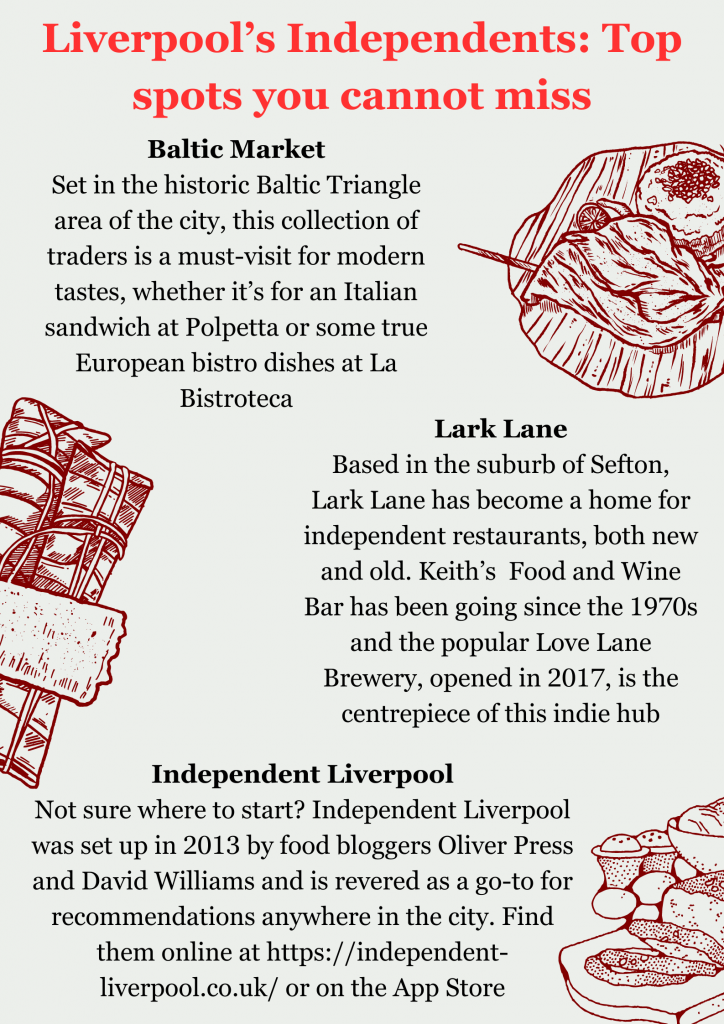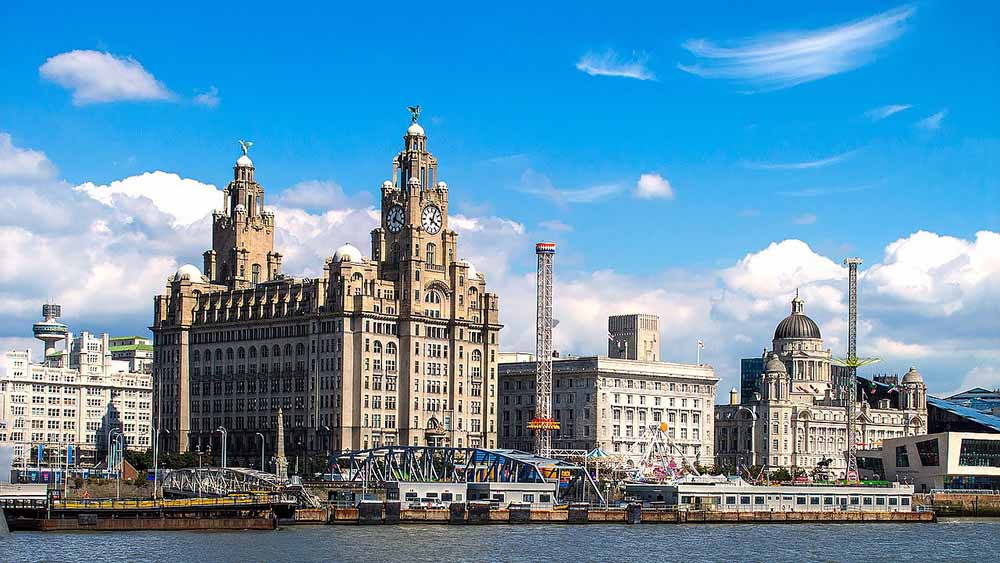With the hospitality industry struggling to recover from the perfect storm of Covid, Brexit and the cost of living, could it be last orders for Liverpool’s independent restaurants?
It’s hard to depict the spirit that defines Liverpool.
Jürgen Klopp, the beloved football manager of the red half of the city, calls it ‘the city of open arms’ and it’s a not a bad place to start.
A history of left-wing politics, era-defining music, footballing triumph and tragedy – everyone shares in every aspect of life in the city. It’s no different when it comes to food.
In 2020, brothers Ellis and Liam Barrie decided it was their opportunity to join the city’s thriving independent restaurant landscape with Lerpwl – bursting with Welsh and northern produce that could take on the city’s intercontinental fare.
With their background in running the award-winning Marram Grass in Anglesey and even an appearance on Great British Menu from Ellis, they were primed for success. The Times called Lerpwl a ‘Welsh wonder’ in 2022.
But in March 2023, Lerpwl vanished from its space in the Albert Docks, its owners saying the business couldn’t survive post-Covid trading.
For fellow owner Peter Kinsella, who runs the award-winning Catalan restaurants Lunya and Lunyalita, losing Lerpwl was heartbreaking, but it was equally a sign that the hospitality industry was changing for the worse.
“They’re a great example of in good times, they would never, ever have closed. Five years ago, when places closed, it didn’t surprise you. They tended to be a daft idea, or it wasn’t a good location, something wasn’t right about the food or service. Whereas now, fundamentally sound businesses are closing, not because of any of those things, but because they’ve run out of cash.”
The UK hospitality industry has been battered by what Peter calls ‘a series of biblical plagues’ – namely rising energy prices, soaring produce costs, and the backbone of the industry, staffing, undergoing a fundamental change over the last few years.
“Last year was the most challenging year we’ve had. This year is the second most challenging,” said Peter.

Energy bills have been a constant source of worry for most households in the UK since costs soared following the end of the Covid-19 pandemic as demand rose, only to be compounded by the Russian invasion of Ukraine in 2022 harming supply. When it comes to hospitality, one of the most utility-intensive industries, the numbers involved are eyewatering.
“We used to spend £57,000 on utilities. Last year it was £250,000 and it’s down to about £185,000 this year. That feels like a win, but we’re still paying three times what we used to,” said Peter.
Energy has become the latest in a long line of pressures on restaurants and nobody has been spared – even the acclaimed chef Tom Kerridge was quoted a 600% increase on his energy bill for his two Michelin star pub, The Hand and Flowers, and now pays on a monthly basis due to the volatility of the energy market.
So the cost to have your restaurant and kitchen running is already high. We haven’t even started to cook anything yet.
Produce costs have also skyrocketed in recent years as supply has been slashed by conflict and climate change, and if there is one thing that every restaurant in the nation depends on, it’s oil.
Rapeseed oil is the backbone of Lunya’s operations and the restaurant is at the mercy of low supply, once again caused by the war in Ukraine.
“They were the major providers of cooking oil and especially rapeseed oil and that’s stopped. We were paying £17 for a 20L drum, bearing in mind we get through about 25 of those a week, that peaked at £59 and it’s now down to about £30,” said Peter.

In yet another cruel twist, this gets worse for Spanish and Italian restaurants, of which Liverpool is very much a fan.
Drought has slashed olive yields, making olive oil a rare commodity. But a whole supply chain of Spanish goods has seen their production suffer as well.
“Manchego cheese has gone from £13 a kilo to £22 – drought has meant that the yield for milk has really dropped because there just aren’t any pastures to graze on,” said Peter.
Even if goods can get to the British border, the dreaded B-word rears its head: Brexit.
The free flow of goods that Lunya once benefitted from has slowed to a crawl as red tape and transportation costs have slowed the import of stock to five or six weeks from ordering, compared to just a few days in the past.
Brexit also fundamentally changed staffing in the hospitality industry. When new rules raised the minimum salary threshold for a skilled work visa, London experienced a flight of staff that has left Italian restaurants struggling to replace them. Peter has seen firsthand just how hard it is to fill the gaps in Liverpool.
“The average age for our workforce, if you leave aside our senior management, used to be 29. It’s now 22,” said Peter. “So it’s more costly, because you have to do a lot more training, and the reality is that it’s a challenging group of people to employ.”
Peter is all too aware of the financial risks of hospitality businesses closing – he notes that in the 14 years that Lunya has been open, the business has paid over £10 million in tax – but for Liverpool in particular, he knows the independent culture it so greatly admires could be lost too.
“People love to support independent places. They’re not fussed about going to a Zizzi or Gordon Ramsay’s Bread Kitchen. They want to support their local restaurant because they are committed to having a diverse economy, and loads of people feel like that. So as a business, you’ve got a big responsibility, I think, to cultivate that relationship. And to make sure it grows stronger.”
A strong relationship is arguably what saved Lunya and Lunyalita back in 2020.
A passionate letter to then-prime minister Boris Johnson shone a light on closed restaurants which were relying on government loans simply to stay afloat, Lunya included, which propelled Kinsella to the headlines of BBC North West Tonight.
Liverpool as a whole responded – they wouldn’t stand for losing Lunya.
“I was convinced we were going to go bust. We wrote to our customers to say ‘We think we’re buggered, but if you want to help, buy online from us.’ Within four or five weeks, we completely sold out of everything and we were having to scour wholesalers for Spanish produce so we could replenish and carry on selling,” said Peter.
Peter claims he even bought the UK’s entire supply of Spanish beer in the process.
The restaurant’s 70,000 registered customers, and countless others, did their part. It wasn’t just about saving the business, but saving its contribution to independent restaurant culture.
“If we were ever seen as just a restaurant, for me that would be an absolute failure on our part. It’s lovely that you can develop something that people do feel is authentic without it being a pastiche either. You won’t find any posters of bullfighters in our place. What you will find is a lovely, welcoming vibe, the best of everything we can find, and the feeling of going to a lovely place in Spain,” said Peter.

With one eye on the future, Peter knows that local support is only part of resolving what is a complex, and still developing, crisis in the hospitality industry.
Another includes changing the way in which we talk about the hospitality industry. As the third-largest employment sector in the UK, it is often maligned as a low-skilled sector, something that Peter thoroughly rejects.
“Our sector is it isn’t seen as a fancy, sexy, technological sector. It’s so frustrating when you hear people talking about it being a low-skilled sector – actually, the low level of skill is the person who presses the on/off button on Jaguar Land Rover’s production line. People skills, the ability to read situations, just cooking a piece of fish perfectly are really, really difficult skills to have.”
The most important focus, however, should be on providing immediate relief for businesses, not long-term strategy.
“The most immediate thing any government could do would be a short-term reduction in VAT. We’re the only place in Europe that has VAT on eating out at 20%. Everywhere else, it’s 10% or 11%. For places that are really close to the edge, that would make a massive difference to them.”
